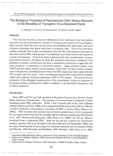The Biological Properties of Recombinant CMV Strains Relevant to the Biosafety of Transgenic Virus-Resistant Plants
JIRCAS international symposium series
| ISSN | 13406108 |
|---|---|
| NII recode ID (NCID) | AA1100908X |

Full text
intlsymp-5_227-232.pdf242.16 KB
Over the last ten years, numerous laboratories have introduced viral coat protein(cp) genes into plant genomes as a means of creating novel sources of virus resistance. More recently, there has been concern about the possibility that large scale cultivation of plants expressing viral genes could lead to ecological risks. One of the most problematic potential risks is that recombination between the viral sequence expressed by the plant and the RNA of the genome of an infecting virus could result in the creation of a novel virus genome. It has been shown experimentally that recombination in transgenic plants can occur, and thus one of the key questions concerning recombinant virus genomes is whether recombinants can have a competitive advantage or aggravate disease symptoms, in comparison to the parent strains. Using cucumber mosaic virus (CMV) and the closely related tomato aspermy virus (TAV), we have created recombinant viral genomes, including those in which the CMV cp gene has been replaced by the TAV cp gene, and vice versa. Such recombinants theoretically could arise by recombination upon infection of plants expressing a CMV or TAV cp gene. We present here an evaluation of the biological characteristics of the recombinant viruses as compared to the parent strains, including their ability to replicate, to spread within host plants, and to induce symptoms.
| Creator | K. Salanki Carrere M. Jacquemond E. Balazs M. Tepfer |
|---|---|
| Publisher | Japan International Research Center for Agricultural Sciences |
| Available Online | |
| Issue | 5 |
| spage | 227 |
| epage | 232 |
| Language | eng |
